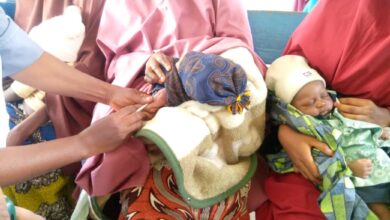UNICEF calls for urgent need to address child mortality in Nigeria.
By Uzairu Daida Bunga

UNICEF has called on media practitioners to intensify efforts in raising awareness on the urgent need to ending child mortality, aiming to strengthen health systems for the benefit of Nigerian children.
The called was made by the UNICEF’s Chief of Bauchi Field Office, Dr. Nuzhat Rafique during a media dialogue on ending child mortality held in Plateau State, with participants from Bauchi, Gombe, and Taraba states.
Represented by Dr. David Audu, the Bauchi Chief of field office, emphasized UNICEF’s commitment to protecting children’s rights, ensuring access to quality healthcare, education, and overall welfare.
Dr. Rafique highlighted the importance of children’s rights to be born in health facilities, receive complete immunizations, and have access to good nutrition and clean water as fundamental measures for survival.
In a presentation on child mortality, Dr. Adah Ruth, a pediatrician at Jos University Teaching Hospital, revealed that globally, 5 million children die within their first week of life every year due to preventable causes.
Dr. Ruth pointed out the high child mortality rates in Africa, particularly in Nigeria, where factors such as poor socioeconomic conditions, inadequate health infrastructure, malnutrition, and unhygienic environments contribute significantly to child deaths.
According to National Demographic Health Survey, She said in Nigeria, an estimated, 41 out of 1,000 newborns, 63 out of 1,000 infants, and 110 out of 1,000 children under five die each year, with Northeast Nigeria recording the second-highest mortality rate in the country.
The survey also indicated, in Bauchi State, under-five mortality has worsened, with deaths rising from 41 per 1,000 live births in 2019 to 48 per 1,000 in 2023.
Dr. Ruth called for collaborative efforts from parents, government, development partners, and community leaders to address these alarming statistics and save lives.
In his presentation, the Health Officer from UNICEF’s Bauchi Field Office, Dr. Uluseyi Olusunde presented trends on child mortality in Bauchi, Gombe, and Taraba, stressing the need to ensure children’s health and well-being.
He noted that 70% of child mortality cases in Nigeria are preventable through straightforward measures such as breastfeeding, handwashing, immunization, proper nutrition, and access to clean water, said child mortality remains high due to low adherence to these practices.
Dr. Olusunde cited data showing that Nigeria accounts for 1 million of the 5 million global child deaths each year, for Bauchi, Gombe, and Taraba alone report mortality rates of 38, 45, and 37 children per 1,000 lives birth respectively, noting that the Sustainable Development Goals (SDGs) target aims to reduce this number to 17 per 1,000 by 2030.
He added that, a recent survey (NDHS 2023/2024) highlights that about 7 out 10 (around 70%) of births in Bauchi and Taraba occur at home, and about 5 out of 10 deliveries (55.1%) in Gombe, occurs at home.
Dr. Olusunde further revealed that, nearly 3 out 10 (30%) of newborns in Bauchi and Taraba and 5 out of 10 (50%) in Gombe do not receive postnatal care, and three out of ten children in these states lack essential immunizations.
Also in his presentation, th UNICEF’s Health Specialist in Bauchi Field Office, Dr. David Audu defined child mortality as the death of children under five and stressed that Nigeria’s neonatal, infant, and under-five mortality rates remain unacceptably high.
He identified major causes of child mortality as complications from premature birth, pneumonia, meningitis, diarrhea, and malaria, with half of these deaths occurring in newborns.
Other contributing factors he mentioned include poverty, inadequate nutrition, unsafe drinking water, poor maternal health, limited access to quality healthcare, and cultural practices that prevent timely medical intervention.










